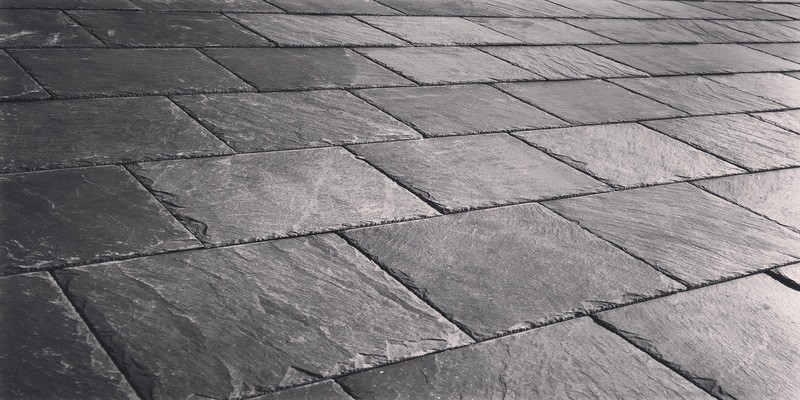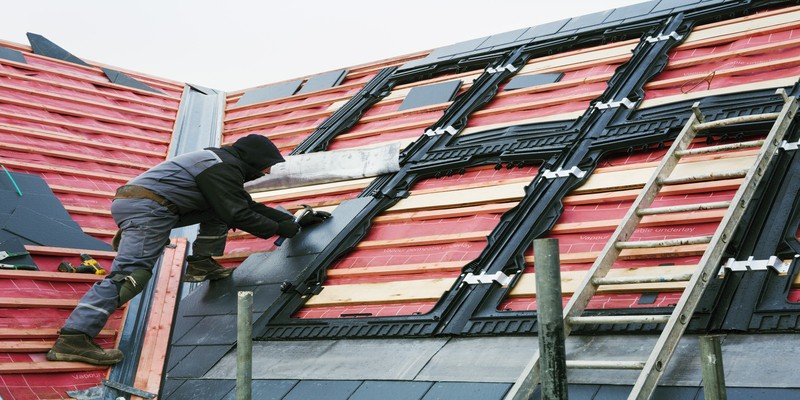Slate Tile Buying Guide

When it comes to building a roof, you want to make sure that you get it right; from proportions to tile type there’s a lot to consider. A slate roof, in particular, is an excellent investment, doubly so if you are looking to keep your home in the long term. Slate roofing is sleek and elegant, there are lots of variations in style and colour as well as a long list of benefits that work towards making slate one of the best, if not the best option for roof renovations.
Carry on reading for guidance in buying slate tiles, maintaining, and repairing your tiles, as well as a rough estimate of pricing and costs for installations and repairs.
Contents
- Where Does Slate Come From?
- Do I Need Planning Permission?
- Advantages of a Slate Roof
- Types of Slate Roofing
- How Much Does Slate Roofing Cost?
- How Long Should a Slate Roof Last?
- How to Fit a Slate Roof
How Does Slate Come From?
Slate is formed when muddy clay splits into thin plates and can be mined at a slate quarry. The slate business concentrates on slate extraction and refining for most of its uses, including roofing or flooring.
It comes from many corners of the world from Wales to Brazil, Portugal to Vermont and is frequently used as a roofing material due to its low water absorption index of less than 0.4%. This makes it virtually waterproof as well as resistant to frost and fire damage. You’ll also find it to be a strong electrical insulator.
Do I Need Planning Permission?
You won’t need planning permission when installing a slate roof on your property, however, you may need Building Regulation approval. To gain approval, your roof must meet these standards:
- Able to withstand the weight of a new roof
- Adequate weatherproofing
- Drainage and ventilation must meet building code requirements
- Fireproof
- Have appropriate insulation - If your existing insulation does not meet current regulations, you will need to replace it
- Sufficient structural integrity
Keep in mind, however, that you may not need to seek approval yourself if you are using someone registered with a competent person's scheme.
Slate roofing is also far heavier than most other types of materials, so it’s important to take the added load into account. Both on your roof’s frame and on your back (if you are planning of attempting a DIY install).
Advantages of a Slate Roof
|
Advantages |
Description |
|
Energy Efficient |
Since slate is so opaque and boasts such a dense molecular structure, its energy efficiency is like no other tile in its field. In the summer it works towards keeping hot air out, and in the winter, keeping warm air in. Although the total amount of energy saved may differ depending on where you live as well as the condition and efficiency of the rest of your home, a 10% boost is well within the realms of possibility. |
|
Long Lifespan |
Slate roofing offers up to 100 years of service, and in some cases can surpass 150 years if they are well taken care of. Slate roofs appear to boast almost eternal life, and with good reason; as they are made of raw, natural stone they have already been around for millions of years. |
|
Element Resistant |
Say goodbye to distressing roof repair costs with the installation of slate roofing. Inherently resistant to rain, wind, and fire, slate tiles offer almost complete immunity to the elements. It is non-porous and thus highly water resistant, heavy enough to avoid being damaged by high winds and well able to withstand high temperatures without deteriorating. |
|
Aesthetic |
Slate tiles are not only functional but also highly attractive and elegant. With many options to choose from and wide a range of colours from true black to deep green, red and grey, you can be assured there is a slate tile type perfect for you. |
Types of Slate Roofing
As previously mentioned, there are many different types of slate roofing types to suit almost all requirements, whether functional or aesthetic. These types include:
|
Type |
Qualities |
|
Fibre-cement slate |
Made from a combination of cement and fibres, these tiles are easier to install than natural slate thanks to their lightweight nature. Fibre-cement tiling offers more colour and texture options than natural slate can offer and boast a lifespan of up to 60 years, in some cases more. |
|
Man-made slate |
Less durable than natural slate again, man-made slate is made from ground-down slate and resin. Unfortunately, since their colouring is unnatural, this sort of tile will need re-coating occasionally to upkeep their colour. Boasts a wide variety of colour options. |
|
Natural Slate |
Natural slate tiles boast the longest lifespan of all tile types and can survive for over 100 years with the right care and maintenance, which thankfully they don’t need a lot of. With high levels of water resistance, these tiles tend to be the best choice to handle the heavy rainfall that the UK can experience. |

When it comes to natural slate tiles, there are various options to choose from. We’ve selected 4 of the most popular types of slate tile below.
|
Type |
Colour |
Qualities |
|
Brazilian |
blue/green/cyan/purple |
Lasts around 75 years and has a very high resistance to damage. |
|
Canadian Slate |
dark blue/ grey-black/purple |
Durable and lasts around 75 years. |
|
Spanish Slate |
black/grey |
Contains quartz and has a life span of around 75 years. |
|
Welsh Slate |
dark blue-grey |
Extremely durable and water resistant which allows for a lifespan of over 100 years- if taken care of. |
How Much Does Slate Roofing Cost?
On average, 1M2 of Welsh slate tiling could set you back around £40-£60, with the average roof installation costing anywhere from £3,500 to £10,600. If you’re dead set on slate tiling but looking for a cheaper alternative, consider Spanish Slate is a fantastic option, with some as low as £18 per M2
You should also factor in accessory costs:
|
Accessory |
Cost Estimate |
|
Breathable Membranes |
£5 per m2 |
|
Nail/Fixings |
£75 |
|
New Flashings |
£30-£55 |
|
Roof Battens |
£22 per m2 |
|
Vapour Barriers |
£4 per m2 |
Some contractors include the cost of scaffolding in your original quote, and some don’t. Should this happen, you must then make the arrangements yourself to hire scaffolding for the job. Scaffolding hire on a weekly basis will incur charges between £40 - £150 a day.
How Long Should a Slate Roof Last?
As said previously, your slate roofing can last up to 100 years, sometimes more if taken care of properly. However, there are sometimes factors that can greatly impact the durability capacity of your roof.
If there is a lack of ventilation in your roof this can lead to a build-up of dampness and mould which harms your structure and affects its longevity. Poor installation also impacts your roof’s lifespan - this is why it is important to only go to reputable, trusted installers.
Another factor that affects your roof’s lifespan is the direction they face. South-facing tiles combined with a dark colour will harness more sunlight which is harmful to your roof in the long run. Lastly, the slope and angle of your roof’s pitch also have an effect - a higher pitch tends to equate to a much longer life expectancy.
How to Fit a Slate Roof
First things first, you’ll need to double-check that the pitch of your roof is above 20°, as this is typically the minimum suitability for most natural slate. With this done, the next steps are to remove your current covering, fit a membrane and then set out your battens. Only after this can you begin to lay your slates, starting at the eaves and using a staggered laying pattern to improve structural integrity. For a more detailed guide on laying slate, you can check out our handy guide here.

Final Thoughts
We sincerely hope you found this article beneficial and that you now have a better grasp of slate tile roofing. Once you have found your ideal slate, we recommend leaving the installation to an expert due to the intricacy of the installation and the significant risk of long-term damage (and costly repairs) should a mistake be made.
Regardless of the additional cost, you'll be able to sleep peacefully knowing your roof is strong and built in accordance with the most recent building regs. Should you have any more questions about slate or need a hand picking out the best tiles for your next project, feel free to get in touch with our award-winning customer service team on 01295 565565 or by using the chatbox down below. We’ll be happy to help.
Please be aware that this guide has been written for informational purposes only. We recommend that you consult a specialist before making any final purchase decisions.